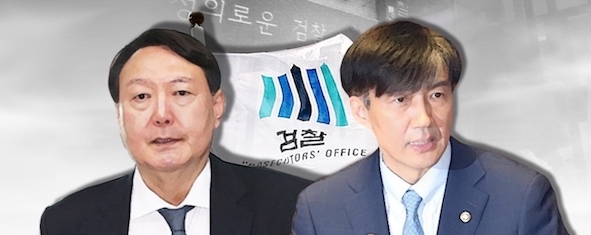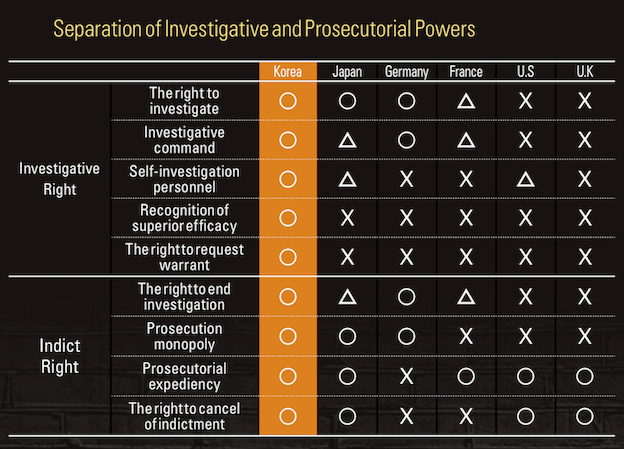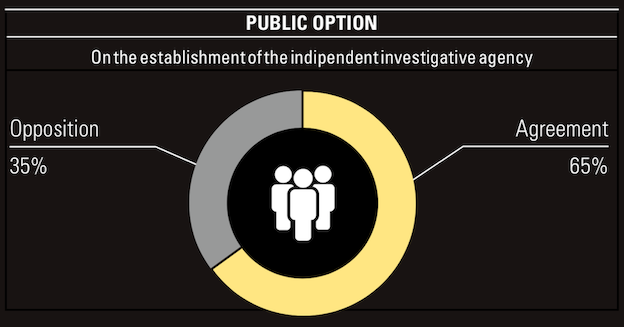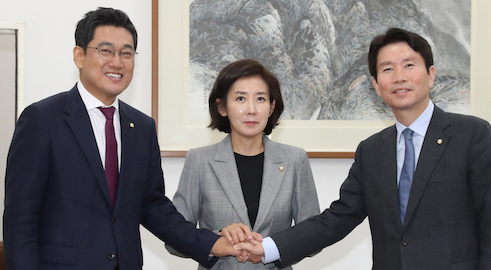
Prosecutorial Reform: Bring about National Division
On October 14th, the Minister of Justice Cho Kuk, who was pushing for reform of the Office of Prosecution, resigned just 35 days after taking the office. On the surface, it can be said that the decision was made to step down due to constant suspicions surrounding Cho's family. Cho's resignation, however, implies the revitalization of social discussions on institutionalizing prosecution reform. This affair led to a conflict of opinion between the ruling party (the Democratic Party) that advocated for the reform of the Office of Prosecution and the opposition parties (the Liberty Korea Party and the Bareunmirae Party). Based on this, rallies calling for the reform of the Office of Prosecution, and rallies denouncing the regime with the nature of opposing it were held simultaneously in Gwanghwamun and Yeouido, showing signs of deepening social conflict. Then, let's find out what Office of Prosecution reforms are, which are causing national division, and what issues they have with CAH.
What Is Prosecutorial Reform?
National Assembly Speaker Moon Hee-sang expressed his position that he will submit four bills on prosecution reform to the plenary session to be held on December 3rd. He also expressed his willingness to quickly introduce the bill after it is published and take steps to call for a vote. The ultimate purpose of prosecutorial reform is to reduce the power of the Office of Prosecution. There are four major reform bills for the prosecution, which are currently under political discussion, including the adjustment of investigative powers between the prosecution and police, the establishment of an independent investigation office (Independent Investigative Agency against high-ranking public officials' corruption), non-prosecution of the Justice Ministry, and the political neutrality of the Office of Prosecution. Among them, the key content of the prosecution's reform, which has become a hot topic of conversation, is the separation of investigative and prosecutorial powers and the establishment of an independent investigation office.
a. Separation of Investigative and Prosecutorial Powers
Prosecution is the process of examining whether there are any problems in the investigation process itself. Usually, the police have the right to investigate and prosecutors have the right to indict. In South Korea, however, the Office of Prosecution has both powers. Then, why has Korea formed such a powerful prosecution power? In the 1950s, when Korea's criminal procedure law was first enacted, the majority of police were pro-Japanese. There have also been several cases in which a large police organization of up to hundreds of thousands of people has used super-legal power, including arresting and detaining people without warrants. In order to keep such an unreliable police organization in check, Korean society wanted to put the police under control by giving the prosecution enormous power. Based on this background of the times, Korea's unique criminal justice system was formed. The above picture shows a comparison of the powers of inspection of major developed countries. According to the report, South Korea is the only advanced country in the picture where the Office of Prosecution has the right to both investigate (the right to investigate, investigative command, self-investigation personnel, recognition of superior efficacy, the right to request warrant) and indict (the right to end investigation, prosecution monopoly, prosecutorial expediency, the right to cancel of indictment).

However, since the Office of Prosecution conducts both investigation and indictment, the problem arises that there is no agency to monitor it even if there are problems in the investigation process itself. In addition, there has been a practice of prosecuting the matter under investigation unconditionally. According to a survey from 2011 to 2015, the average number of errors in which the indictment opinion has been changed to non-criminatory amounts to about 30,000 a year. These problems have led to demands for separating the investigative and prosecutorial powers and put the role of the Office of Prosecution in check. First, if the right to investigate is adjusted, the responsibility of the police investigation would increase. This is because the police can increase their responsibility to the public as they take on the whole process of launching, carrying out, and evaluating the results of their investigation. In addition, an early conclusion at the police level is possible only in cases where the indictment is clear, which is expected to ensure the benefit of the people by preventing double investigation. Second, the objectivity of the Office of Prosecution can be increased. If the structure of the police investigation, which had been dominated by prosecutorial prosecutors, is changed, it can eliminate the so-called ‘covering up my family’, or corruption that intentionally overlooks the wrongdoings of prosecution members. Finally, human rights can be guaranteed under check and balance. If police and prosecutors cooperate with each other outside vertical relations and fulfill their respective responsibilities, they will be able to take the lead in protecting the human rights of the people.
b. Establishment of the Independent Investigative Agency Against High-ranking Public Officials' Corruption
If a prosecutor commits a crime, the police must apply for a search warrant from another prosecutor for investigation. However, under the aforementioned ‘covering up my family’, prosecutors often turn down warrants, intentionally disrupting investigations. Lim Eun-jung, a senior prosecutor at the Ulsan District Prosecutors' Office who accused former and incumbent senior prosecutors of corruption, expressed critical views over the fact that two search warrants were rejected regarding the case she opened. Based on this, there is a need for the Office of Public Administration, an independent agency that focuses on the corruption of high-ranking government officials and their families, including the president, members of the National Assembly, judges, heads of local governments, and of course, prosecutors. The introduction of the Independent Investigation Office is currently being discussed based on the intention of preventing the prosecution from becoming a political power themselves by transferring investigative rights, indictment rights and the right to retain public posts, which were previously monopolized by the prosecution, to independent agencies. What do people think about this? Realmeter, a polling agency, conducted a poll of 500 adult men and women on October 29th asking for their opinions on whether or not to set up an Independent Investigation Office. The results were 61.5 percent for and 33.7 percent against, with the approval rating overwhelmingly in favor. Public opinion among those in their 20s (19-29) was 71.4 percent in favor of the establishment of an independent agency. In other words, there are prevailing opinions in Korean society that calls for the establishment of an independent office. The opinions are helping the main opposition Democratic Party of Korea push for a bill to install an Independent Investigation Office.

A Variety of Perspectives on Prosecutorial Reform
The three ruling and opposition parties are on a more complicated negotiation front than ever over the reform of the Office of Prosecution. While the three parties formed a basic consensus on the need to coordinate investigative rights between the prosecution and the police, their detailed positions on the installation of the office take different aspects. Currently, the Liberty Korea Party is in a standoff with the Democratic Party of Korea, insisting on the full opposition of the agency itself. It can be seen as a long-standing criticism that opponents of the prosecution's reform argue that the Independent Investigation Office is highly feared to become a rooftop house agency. A rooftop house means putting another roof on the roof, which implies the establishment of the office is nothing more than creating a stronger power agency to keep the prosecution in check. In a meeting held on October 16th, Na Kyung-won, floor leader of the opposition (Liberty Korea) Party leader, criticized that it is self-contradictory to create another monster called the Independent Investigation Office and give both the right to investigate and indict.
In a similar context, floor leader Oh Shin-hwan of the Bareunmirae Party also expressed opposition, saying the bill submitted by the Democratic Party to establish an independent investigative agency should not be passed as it is aimed at creating a new monster organization. He also added that if the prosecution's reform is implemented through the separation of the prosecution's investigative and prosecutorial powers and the adjustment of the prosecution's investigative power, the independent agency that has been proposed as a reform plan does not have to be set up. In addition, the Bareunmirae Party has put forward the ‘anti-corruption investigation office’ act as an arbitration proposal to ease the deepening conflict between the Democratic Party and the Liberty Korea Party. Under the law on the establishment of a criminal investigation department for high-ranking government officials, which is currently being pushed by the Democratic Party, the independent office will have the right to indict. Oh Shin-hwan said, if the Democratic Party withdraws its opinion that it will grant both investigative and prosecutorial powers to the office and agrees to create an anti-corruption investigation office that only has investigative power, they will be able to reach an agreement between the three ruling and opposition parties.

How Does the Office of Prosecution React?
Yoon Seok-yeol, the chief prosecutor of the prosecution, claimed that he does not oppose the reform itself, indicating the prosecution will follow the people's opinion. Yoon's main position, however, is that the prosecution itself should become the main body of the prosecution's reform and carry out active reform of the prosecution. Accordingly, the prosecution announced a series of its own reform proposals. On October 1st, the first reform plan, which calls for 'reducing the special branch' and 'returning to the inspection of dispatch of outside agencies', was announced. Since then, the Office of Prosecution has come up with reform measures in turn, which include 'all-out abolition of public summons', 'abolition of late-night investigations', 'minimizing and limiting direct investigations' and 'introducing a system of professional public information officer'. In addition, the prosecution announced on October 16th its plan to establish a 'human rights protection investigation system' by establishing a human rights committee. On October 24th, it proposed measures to improve inspection functions such as strictly restricting the accept of resignations of prosecutors who committed irregularities and strengthening outside control. According to the announcement of the seventh reform plan, the prosecution will expand the right of lawyers to participate in investigations in the course of the prosecution's investigation by strengthening their right to defend themselves. This means that not only the suspect but also the victim and the witness can be present with the lawyer during the prosecution's investigation in the future, which has the advantage of ensuring fairness in the investigation.
As such, the prosecution reform bill has recently become Korea's hottest social issue. Social consensus has been reached that the prosecution's strong investigative and prosecutorial powers should be adjusted among the contents of the reform. On the other hand, the two sides are still at odds over the introduction of an independent investigative agency. Public opinion prevails in calling for the establishment of an independent agency, but it cannot be denied that it risks turning into another powerful organization. Measures are needed to prevent abuse of power in order to prevent a repeat of corruption. Therefore, the establishment of an independent investigative agency should be decided after sufficient discussions. In addition, instilling the prosecution's own will to improve through a careful process of agreement with the prosecution is just as important as the institutionalization of the prosecution's reform bills. As the national interest is focusing on reforming the prosecution, CAH hopes that the three parties will come up with a reasonable direction for improving the prosecution and resolve the prosecution's corruption problems that continue to occur.
Sim Seong-a
tlatjddk2019@cau.ac.kr

